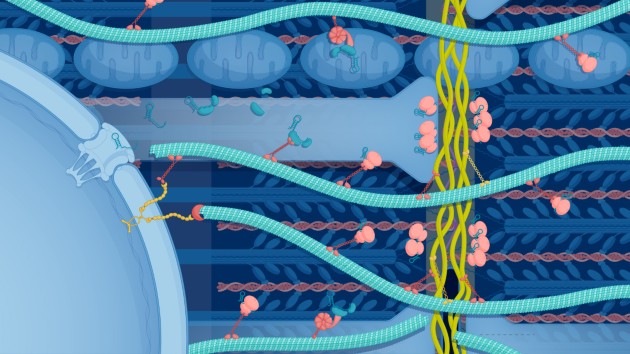Focus |
Collections
Filters
-
Collection Type
-
-
Focus |
 Cardiac development and regeneration
Cardiac development and regeneration
This focus issue from Nature Reviews Cardiology provides a broad overview of the most important recent advances in heart development and regeneration. These specially commissioned articles highlight the opportunities of integrating the knowledge gained from preclinical and clinical studies to guide the development of new therapies and the design of future clinical trials of heart regeneration.
Image: V. Summersby -
Focus |
 Cardiovascular ageing
Cardiovascular ageing
Ageing is a major risk factor for cardiovascular diseases. This Focus issue from Nature Reviews Cardiology describes the mechanistic pathways involved in cardiovascular ageing (mitochondrial dysfunction, oxidative stress, inflammation, cell senescence, telomere shortening, and endothelial dysfunction) and therapeutic approaches aimed at slowing the deleterious effects of age on the heart and vasculature.
Image: V. Summersby -
Focus |
 Cardiomyopathies
Cardiomyopathies
The term 'cardiomyopathy' describes a group of diseases affecting the heart that are characterized by structural and functional abnormalities in the absence of hypertension, coronary artery disease, and valvular or congenital heart conditions. Cardiomyopathies are important causes of sudden cardiac death among young individuals. This focus issue features two Perspectives articles and a Review article written by leading experts that highlight some of the mechanisms underlying two of the most prevalent cardiomyopathies: hypertrophic cardiomyopathy and Takotsubo cardiomyopathy.
Image: V. Summersby/Macmillan Publishers Limited -
Focus |
10th anniversary
November 2014 marks the 10th anniversary of Nature Reviews Cardiology, originally published under the titleNature Clinical Practice Cardiovascular Medicine. To celebrate this milestone, we have commissioned a collection of articles to summarize the major advances in cardiology over the past decade. These articles, together with a special infographic, provide an authoritative snapshot of cardiovascular medicine in 2014, and how the field might progress over the next 10 years.
-
Focus |
Anticoagulation therapies
Important advances in anticoagulation therapy have been made in the past few years. Many novel agents, including oral factor Xa inhibitors and direct thrombin inhibitors, are currently under investigation as alternatives to vitamin K antagonists in various clinical settings. This focus issue features four Review articles, written by leading experts, in which new clinical trial data and controversies in the field are discussed and put into context.
-
Focus |
 Hypertension
Hypertension
Despite the availability of multiple pharmacotherapies and the known preventative capacities of life-style modification, hypertension remains a highly prevalent disorder worldwide. Indeed, high blood pressure (BP) is estimated to result in approximately half of the global burden of cardiovascular disease.
-
Focus |
Antiplatelet therapies
Platelets have a central role in thrombosis, including in the pathogenesis of coronary artery disease and acute coronary syndromes. Therapies that target the platelet are, therefore, a vital component of our armamentarium against ischemic cardiovascular events. Antiplatelet therapy is a fast-moving area of research that is of interest not only to cardiologists, but also to general internists, surgeons, medical geneticists, as well as policy and decision makers. This focus issue features five Review articles and a Perspectives opinion piece, written by leading experts, which cover the current major themes in the field.
-
Focus |
Lipids and CVD risk
Dyslipidemia is a major cause of coronary heart disease (CHD)—the most-common cause of death in the Western world—and is characterized by increased levels of total cholesterol, LDL cholesterol, and/or triglycerides, decreased levels of HDL cholesterol, modified function of lipid molecules, or a combination of some or all of these factors. Although mortality rates from CHD have reduced substantially over the past few decades, owing largely to the use of LDL-lowering statins, further strategies for reducing CHD risk are still urgently needed. Given the considerable global impact of dylipidemia, and the accumulating data on risk prediction and mechanisms of disease that have generated multiple potential targets for treatment, we have commissioned a group of articles that review the latest advances in risk assessment, biological mechanisms of disease protection, and diagnosis and management of this disorder.
-
Focus |
Early detection of signs and risk factors for CVD
Early detection of risk factors and signs of cardiovascular disease is an important component of cardiovascular-health promotion. Nature Reviews Cardiology is thus holding a session on this topic at the World Heart Federation's 2010 World Congress of Cardiology in Beijing, China. Review articles that accompany the five talks in this session are published in the June 2010 issue of Nature Reviews Cardiology.
-
Focus |
Atrial fibrillation
This Focus issue on atrial fibrillation (AF) contains three specially commissioned Review articles, written by leaders in the field, on promising new developments in catheter ablation, atrial antiarrhythmic drug therapy, and anticoagulants for stroke prevention in patients with AF. The issue also features News & Views commentaries, a Research Highlight, and an Editorial, discussing important advances in AF research that have been reported in the past few months.

 Cardiac regulatory mechanisms
Cardiac regulatory mechanisms